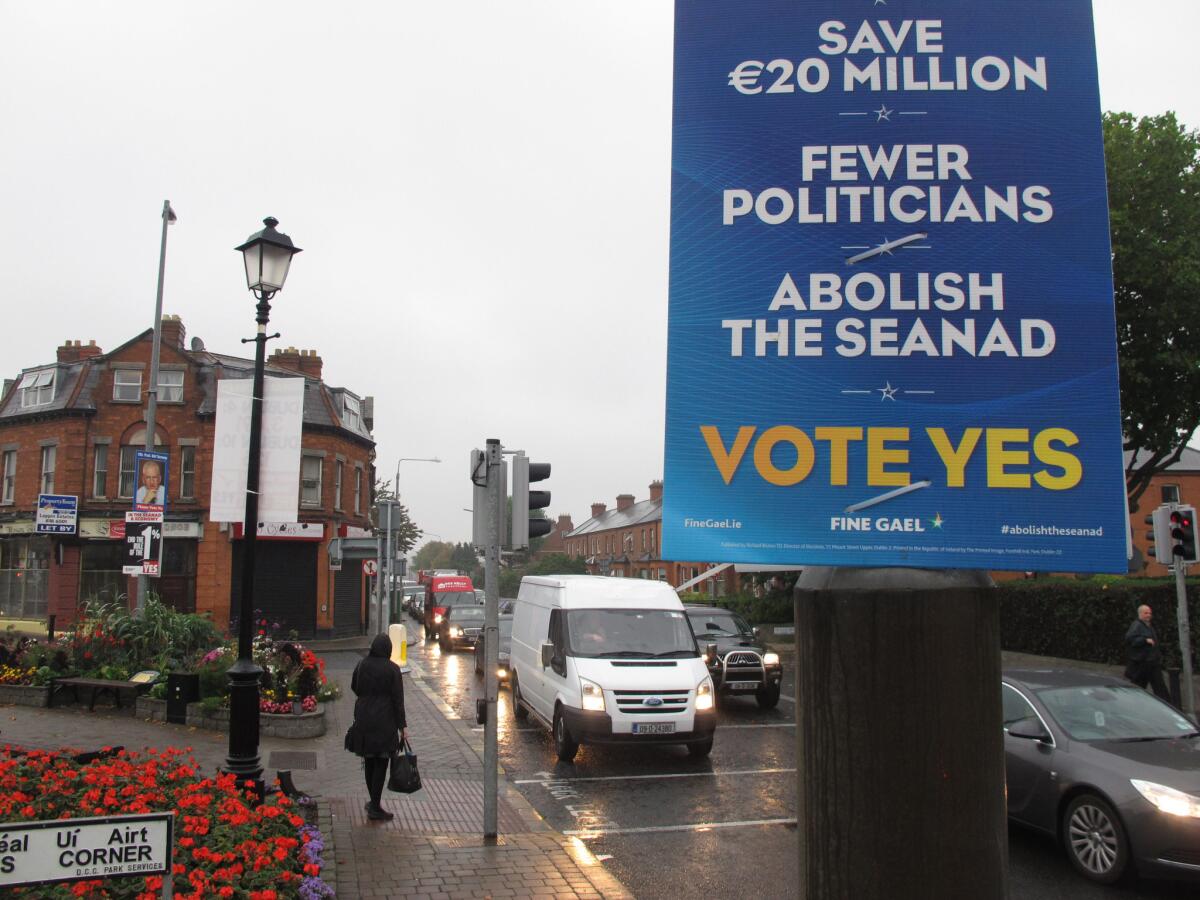Irish voters reject plan to abolish nation’s Senate

LONDON -- In a referendum many Americans would drool over, voters in Ireland have narrowly rejected a proposal to abolish their Senate, despite a vigorous campaign in favor of eliminating the upper house of parliament in order to save money.
Results compiled Saturday showed that 51.7% of those who cast ballots decided the Irish Senate was worth keeping, even though it wields no major powers and costs taxpayers an estimated $27 million a year. The outcome belied opinion polls heading into Friday’s plebiscite that suggested a majority favored abolition.
The “no” vote was a heavy blow to Prime Minister Enda Kenny, who campaigned for ditching the chamber but who was accused of mounting a power grab. Critics detected a stealth attempt to concentrate authority in the lower house of parliament, the Dail, which Kenny’s Fine Gael party dominates.
“Sometimes in politics you get a wallop,” Kenny told reporters. “Naturally, I was personally disappointed .…. This is the first time in over 70 years that the people were asked a question, a direct question, in respect of the Senate, and they’ve given their verdict, and I accept that.”
Opponents were jubilant.
“I always felt it was going to be a tight vote,” said Derek Mooney, one of the “No” campaign’s leading activists. “Irish voters are resistant to change when it comes to their constitution, and this was a dramatic change.”
The Senate has no power to approve, initiate or block legislation. Akin to the House of Lords in Britain, the upper chamber can merely refine or, in rare cases, temporarily delay bills, which hasn’t happened in 49 years. Its 60 members are not directly elected but are chosen by the prime minister, local officials and others; illustrious senators have included Nobel Prize-winning poet William Butler Yeats.
Kenny and his supporters argued that, with Ireland in the grip of massive budget cuts as part of its multibillion-dollar international bailout, taxpayers could ill-afford continuing to subsidize a relatively toothless and undemocratic institution.
But critics said that any savings would be minuscule compared to the size of Dublin’s enormous budget deficit and that getting rid of the Senate would deprive the Irish political system of important checks and balances.
“The whole purpose of the Seanad [Senate] is as a revising chamber,” said Mooney, speaking by telephone from Dublin. “Its function is clear in law. It’s there as a revising chamber, another pair of eyes, to give scrutiny to legislation.”
He said that the upper house has helped protect the interests of minorities who might not be represented in the Dail, such as Protestants or gays and lesbians.
While polls had suggested that the “Yes” campaign would sail to victory, they did not predict the extremely low voter turnout of less than 40%. Kenny also chose not to hold a nationally televised debate on the referendum, leaving his supporters to convey their message through posters and informal gatherings.
Although pro-abolition forces heavily outspent their opponents, those in favor of retaining the Senate energetically spread the word on the airwaves, through social media and by going door to door.
“This is a watershed for Irish democracy, because there was a broad alliance of civic society — youth groups, opposition political parties, historians, all sorts of people, young and old” — working for the “No” campaign, said Michael McDowell, a former justice minister. “This was Irish citizens of a republic saying to the establishment we want to have power spread in the community.”
ALSO:
Despite canceled trip, Obama ‘committed’ to U.S. pivot toward Asia
Iran nuclear talks: Congress is the elephant at the negotiating table
Suspected mastermind of Guatemala police massacre arrested in Mexico
Twitter: @HenryHChu
More to Read
Sign up for Essential California
The most important California stories and recommendations in your inbox every morning.
You may occasionally receive promotional content from the Los Angeles Times.











